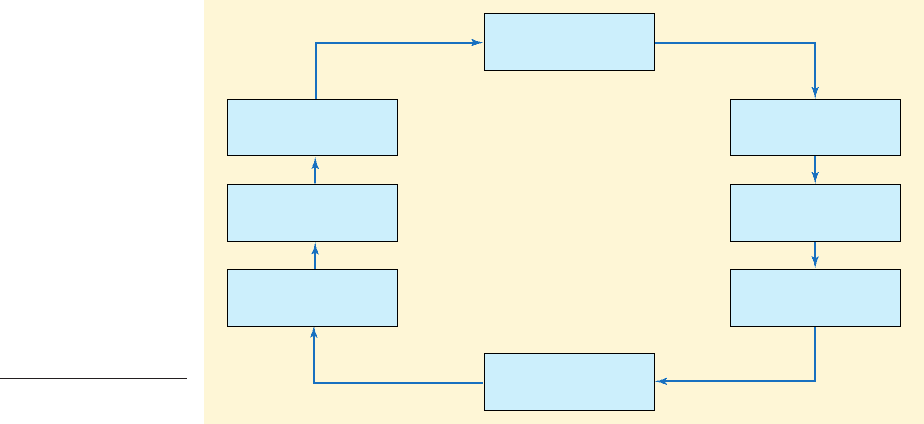Pike Robert, Neal Bill. Corporate finance and investment: decisions and strategy
Подождите немного. Документ загружается.


.
Chapter 14 Short-term asset management 355
Customer credit mission and goals for Makebelieve Ltd
Mission: To maintain and protect a portfolio of high-quality accounts receivable and to develop
sound credit policies and administer credit operations in a manner that increases sales, con-
tributes to profits, aids customer loyalty and improves shareholder value.
Goals:
1 To restrict monthly debtors to 45 days.
2 To achieve agreed monthly cash collection targets.
3 To limit overdue debts to 30 per cent of sales.
4 To limit bad debts to 1 per cent of sales.
5 To resolve credit-related customer queries within 3 days.
6 To improve the relationship between the credit function and major customers through
regular contact and visits.
7 To convert 20 per cent of existing customers to direct debit in the year.
4 Efficiency. Information asymmetry exists between buyer and seller. The buyer does
not know whether the product delivered is of the quality ordered until it has been
thoroughly inspected. The credit period therefore provides a valuable inspection
and verification period. Many companies deliver to customers on a daily basis.
Trade credit is therefore a convenient means for separating the delivery of goods
from the payment of deliveries.
The aims of trade credit management are the following:
■ To safeguard the firm’s investment in debtors.
■ To maximise operational cash flows by assessing customer credit risks, agreeing
appropriate terms and collecting payments in accordance with these terms.
The level of debtors in a company will depend on its terms of sale, credit screening,
cash discounts offered and cash collection procedures.
Effective debtor control policy requires careful consideration of the following:
■ Credit period.
■ Credit standards.
■ Cost of cash discounts.
■ Collection policy.
Each of these are discussed in the following section.
While the main responsibility for setting credit policy lies within financial manage-
ment, other functions should be involved, particularly marketing. However, all too often,
this collaboration is lacking. The credit management process is shown in Figure 14.1.
Reporting
Risk-reduction methods
Credit screening
Credit management
performance
Monitoring receivables
Credit granting
Credit policy
Credit mission
and goal
Cash collection
Credit management process
Figure 14.1
The credit manage-
ment process
CFAI_C14.QXD 3/15/07 7:16 AM Page 355

.
356 Part IV Short-term financing and policies
■ Credit period
The main factors influencing the period of credit granted to customers are:
1 The normal terms of trade for the industry. It is difficult to operate a trade credit poli-
cy where the period offered is considerably below the normal expectation for the
industry unless the company has another clear competitive advantage, such as a
recognised better quality product.
2 The importance of trade credit as a marketing tool. Determining the optimum credit
period requires the finance manager to identify the point where the costs of
increased credit are matched by the profits made on the increased sales generated
by the additional credit. The more vital the perception of credit as a marketing tool,
the longer the likely period of credit offered.
3 The individual credit ratings of customers. Most firms operate regular credit terms for
good-quality customers and specific credit terms for higher-risk customers. The
credit quality of customers is based on the credit standards addressed in the worked
example in Section 14.3.
Credit limits should be set for each customer based on their credit-worthiness. The
firm should consider:
1 Customer payment record: is the customer a prompt payer?
2 Financial signals: is there evidence of the customer running up losses or having liq-
uidity problems?
Very high-risk customers may be reviewed monthly and have to pay, in full or part,
with order. Other customers may be granted credit on the basis of percentage of annu-
al purchases.
credit limits
The maximum amount of
credit that a firm is willing to
extend to a customer
Commonly quoted trade credit terms
■ Cash before delivery (CBD)
■ Cash on delivery (COD)
■ Invoice terms (e.g. 2/10, net 30). A two-stage payment term giving a 2 per cent cash dis-
count for payment within 10 days, otherwise the net amount is due after 30 days.
■ Consignment sales – pay for goods when used or sold.
■ Periodic statement – payment by a specific date for all invoices up to a cut-off date.
■ Seasonal dating – payments due at specific dates to match the buyer’s seasonal income.
■ Credit standards
We have noted that granting trade credit is partly a marketing exercise designed to
increase sales. However, at the individual customer level, it is essentially a credit assess-
ment and control exercise. In this sense, extending trade credit is no different from a
bank granting a loan to a customer. The risk of granting trade credit can be seen when
we consider the effect on profit of customer default. If a company sells a product for
with a 10 per cent net margin, which subsequently becomes a bad debt, the busi-
ness must make ten similar sales to good customers simply to recover the bad
debt incurred.
Credit assessment should involve the following:
1 Prior experience with the particular customer. The credit extended and payment
experience in the past is a useful guide, but it may relate to a time when the cus-
tomer was not experiencing financial difficulty. Even so, it is wise to have more
rigorous procedures for assessing new accounts.
£1,000
£1,000
CFAI_C14.QXD 3/15/07 7:16 AM Page 356

.
Chapter 14 Short-term asset management 357
2 Analysis of the customer’s accounts and credit reports. Profit and Loss Accounts
and Balance Sheets are available from the company’s registered office, but can more
easily be taken from computer databases. Credit reports include:
(a) Bank references
(b) Trade references expressing the views of other businesses trading with the
customer
(c) Credit bureau reports. Credit-reporting agencies (such as Dun & Bradstreet)
provide data and credit ratings that can be used in credit analysis. It is common
practice for firms to offer credit agencies full disclosure of financial and trading
information in order to gain a good rating. From an assessment of the cus-
tomer’s creditworthiness, it is possible to establish appropriate credit rules cov-
ering the terms of sale:
(i) the maximum period of credit granted;
(ii) the maximum amount of credit;
(iii) the payment terms, including any discounts for early payment and
interest charges on overdue accounts.
The businesses most vulnerable to late payment are often those that do least to vet
their customers. According to the Confederation of British Industry, many small firms
fail to chase their late payers with any degree of urgency, partly because their credit
management systems are not good enough to support such activity.
In evaluating customer creditworthiness, it is useful to remember the five Cs of
credit: capacity, character, capital, collateral and conditions.
1 Capacity – does the customer have the capacity to repay the debt within the required
period? This may require examination of the past payment record of the customer.
2 Character – will the customer make a serious effort to repay the debt in accordance
with the terms agreed? Bank and trade references will be useful here.
3 Capital – what is the financial health of the customer? Is the firm profitable and liq-
uid? Is it borrowing beyond its means? Financial accounts and credit agency reports
will help here.
4 Collateral – should some form of security be required in return for extending credit
facilities? Alternatively, should part payment in advance or retention of title be
specified?
5 Conditions – what are the normal terms for the industry? Are our main competitors
offering more generous terms?
■ Cash discounts
The longer a customer’s account remains unpaid, the greater the risk that it will never
be paid. But the cost of financing late payments is often greater than the cost of bad
debts. Surveys suggest that customers, on average, take 30 days’ extra credit beyond
the payment terms.
Cash discounts are financial inducements for customers to pay accounts promptly.
Such discounts can be very costly.
Example: Yorko plc
Yorko plc offers terms of trade which are ‘2/10 net 30’. This means that a 2 per cent dis-
count is offered for all accounts settled within ten days, otherwise payment in full is to be
made in 30 days. A 2 per cent discount may not seem much until one realises that it is given
for a payment in advance of just 20 days (i.e. ). The annualised cost is actually over
37 per cent, calculated by the formula below:
Continued
30 10
CFAI_C14.QXD 3/15/07 7:16 AM Page 357

.
358 Part IV Short-term financing and policies
Self-assessment activity 14.1
A survey of large UK companies (Pike et al., 1998) found that the normal credit period
granted was 30 days, but the average credit period taken by customers was 46 days. Only
20 per cent of firms offered prompt payment cash discounts, with the most common terms
being per cent/net 30 days. For a company offering those terms, what would be the
effective interest rate for granting cash discounts assuming that firms would otherwise pay
within 46 days?
(Answer in Appendix A at the back of the book)
2
1
2
■ Credit collection policy
A good credit collection policy is one in which procedures are clearly defined and cus-
tomers know the rules. Debtors who are experiencing financial difficulties will always
try to delay payment to companies with poor or relaxed collection procedures. The sup-
plier who insists on payment in accordance with agreed terms, and who is prepared to
cut off supplies or take action to recover overdue debts, is most likely to be paid in full
and on time.
Figure 14.2 shows the debt collection cycle, starting with the customer order and
ending with the cash received. Any speeding up of the order will reduce the required
working capital. Late payment by major customers often has a knock-on effect
throughout the supply chain. For example, if a customer of company A pays its debts
The cost of a discount
In the Yorko example, the annualised cost of forgoing the cash discount is:
A more precise calculation is to find the effective annual rate of return. We have already
calculated for Yorko the two elements:
This expression of the cost is greater than in the first calculation because it assumes com-
pound rather than simple interest which is more accurate.
Where such generous terms are available, it probably makes sense for customers to opt
for the discount even if it means borrowing, as long as the cost of finance is clearly below
the annualised cost of discount. So why should firms offer such inducements? First, early
payment can significantly improve cash flow and reduce bad debt risk. Second, cash dis-
counts can encourage new customers who are attracted by the discounts. However, the
financial manager should be aware of the true cost of such discounts and be able to justify
why terms should be offered costing more than the cost of capital.
Effective annual interest rate 11.02042
18.25
1 44%
Number of 20-day periods a year 365>20 18.25 periods
Cost of discount 2>1100 22 0.0204% per 20-day period
37.23%
0.0204 18.25
Cost
2
1100 22
365
130 102
Cost of cash discount
Discount %
1100 discount %2
365
1Final date discount period2
CFAI_C14.QXD 3/15/07 7:16 AM Page 358

.
Chapter 14 Short-term asset management 359
60 days late, this may force Company A to pay its bills late to Company B, which might
create sufficient cash flow pressures for B to go out of business.
It is a sad fact that firms usually only run out of cash once. Second chances are rare
when it comes to cash failure. So getting on top of the credit screening and control
process is vital. Smaller businesses often complain that some larger companies take an
unduly long time to settle their accounts. There is a real problem in British industry
that far too much time and energy has to be devoted to chasing debts, for no apparent
net gain to the business community. The CBI has introduced a Code of Practice, Prompt
Payers – In Good Company, where firms agree to pay within the agreed payment terms.
Businesses have a statutory right to charge larger customers interest on overdue
accounts. The interest rate is set high (currently, Bank of England base rate )
because most firms must finance late payment from bank overdrafts.
CBI prompt payment code
This states that a responsible company should:
■ Have a clear, consistent policy of paying bills in accordance with contract.
■ Ensure that the finance and purchasing departments are both aware of this policy
and adhere to it.
■ Agree payment terms at the outset of a deal and stick to them.
■ Not extend or alter payment terms without prior agreement.
■ Provide suppliers with clear guidance on payment procedures.
■ Ensure that there is a system for dealing quickly with complaints and disputes, and
advise suppliers without delay when invoices are contested.
The CBI has joined forces with other interested parties (e.g. the DTI, the British Chambers
of Commerce, the British Bankers Association, the Institute of Credit Management) to
form the Better Payment Practice Group, which provides a set of best practice guidelines
for both buyers and sellers. Its website (www.payontime.co.uk) gives a listing of the aver-
age payment times of public companies to enable small suppliers, in particular, to moni-
tor and compare the payment practices of these firms. Most listed firms state their
payment policy in their annual reports.
For example, Corus plc, the steel-making firm, declares its policy as to ‘establish
payment terms with suppliers when agreeing transactions, and to despatch cheques
by the due date.’ In 2003, it made purchases of million, and its accounts showed
trade creditors of million at year-end, down from million in 2002. This£1,047£986
£7,253
8%
Customer
receives invoice
Cash received
Reminder
Credit screening
and terms agreed
Goods delivered
Invoice raised
Customer receives
statement
Customer
places order
Figure 14.2
Ordering and debt
collection cycle
CFAI_C14.QXD 3/15/07 7:16 AM Page 359

.
360 Part IV Short-term financing and policies
implied an average payment period on credit purchases of 51 days. Corus claimed to
have nil days purchases outstanding (i.e. in arrears) ‘based on the average daily
amount invoiced by suppliers during the year’.
■ Using debtors as security
The financing of trade debtors may involve either the assignment of debts (invoice dis-
counting) or the selling of debts (factoring). With invoice discounting, the risk of default
on the trade debtors pledged remains with the borrower. Factoring, on the other hand,
can be and usually is ‘without recourse’, i.e. the factor bears the loss in the event of a bad
debt. Factors provide a wide range of services, the most common of which are as follows:
1 Advancing cash against invoices. Up to 80 per cent of the value of invoices can typ-
ically be obtained; repayments (together with interest on the advances) are paid
from the subsequent cash collected from debtors.
The subtle art of getting paid: late payment
Some small businesses develop creative ways to pursue customers who are paying their bills
late.
An antique fireplace shop in north London until recently kept on call a 6ft 3in ex-con
who had two fingers missing on his left hand and halitosis. His job was simple: to persuade
defaulting customers to pay up by going to their workplace and sitting quietly, but
unpleasantly, in the lobby. He seldom had to stay long before the promised cheque
appeared.
Another small businessman, this time in advertising, was owed money by a smart furniture shop.
He took the afternoon off to stand in the customer’s doorway telling people coming in that they
would be ripped off. He had his cheque within an hour.
Neither approach would feature in a business school textbook on credit management, but
both were effective. One spent money on paying someone to chase the debt, the other judged it
an effective use of his time to do it himself. Both related to a simple business problem: staying
afloat when customers delay paying invoices as long as possible.
Each year, 10,000 UK businesses fail because their invoices are paid late, according to Dun &
Bradstreet, the credit management consultancy. Out of billion owed to UK small businesses
last year, billion was paid after the due date.Yet few small businesses make use of legislation
that penalises late payers, and most believe the law can be of little help when withholding payment
appears to be becoming the norm. As an economic downturn approaches the situation is bound to
deteriorate.
To address this, the Late Payment of Commercial Debts (Interest) Act 1998 allows creditors to add
interest to unpaid invoices without having to go to court. A European Community directive, for which
the UK consultation period ends on Friday, would allow companies to claim compensation as well as
interest from late paying customers.
Trade credit is a loan to your customer, yet customer/supplier contracts can be surprisingly
vague on the terms of payment. There are three steps to managing trade credit:
■ Sell the payment terms at the same time as you sell the product, agree those terms and get
to know the person who actually signs the cheque.
■ Eliminate ‘own goals’ such as delivering the product late or sending an invoice that does not
match the delivery note.
■ Be prepared to ask for the money you are owed. Big companies, which are organised, will
introduce interest on overdue accounts automatically. Small companies will not have the
resources to chase up interest payments.
Source: Based on article in Financial Times, 26 April 2001.
£6.8
£17
CFAI_C14.QXD 3/15/07 7:16 AM Page 360

.
Chapter 14 Short-term asset management 361
Self-assessment activity 14.2
What are the main elements in a firm’s credit policy?
(Answer in Appendix A at the back of the book)
14.3 WORKED EXAMPLE: PICKLES LTD
Pickles Ltd produces a single product sold throughout the UK. Its profit analysis is
given below:
Per unit
Selling price 40
Variable costs (36)
Fixed cost apportionment (3) (39)
Net profit per unit 1
££
£000
New business 1,200
New debtors 300
Additional stocks 400
Additional creditors (200)
Required increase in working capital 500
Increase in operating profit 120
Less financing cost (50)
Net profit increase 70
1£500,000 10%2
1£1.2 m 10%2
1£1.2 m 3>122
1£4.8 m 25%2
2 Insurance against bad debts.
3 Administration of the credit control functions. This involves sending out invoices,
maintaining the sales ledger and collecting payments.
We return to this topic in Chapter 15.
Pickles has an annual turnover of million and an average collection period for
debtors of one month. It has conducted a study on entering new European markets
and believes that this would produce an additional 25 per cent of sales, but the new
business would require three months’ credit. Stocks and creditors would rise by
and respectively. The cost of financing any increase in working cap-
ital is 10 per cent.
Operating profit before finance costs increases as a result of the new business by
Sales increase
Contribution/sales ratio
Increase in
The question of whether profits increase as a result of the expansion into European
markets very much rests on whether the existing UK customers also demand more
favourable terms.
1 Assuming only new customers take three months’ credit
profit £120,000
140 362>40 10%
125% £4.8 m2 £1.2 m
£120,000:
£200,000£400,000
£4.8
CFAI_C14.QXD 3/15/07 7:16 AM Page 361

.
362 Part IV Short-term financing and policies
£000
Sales 6,000
New debtors level 1,500
Less existing debtors (400)
1,100
Additional stocks 400
Additional creditors (200)
Additional working capital 1,300
Operating profit increase (as above) 120
Less financing cost (130)
Net profit reduction after financing costs (10)
110% £1.3 m2
11>12 £4.8 m2
13>12 £6 m2
1£4.8 m £1.2 m2
Thus net profits increase by But what happens if existing customers
demand the same credit terms?
2 Assuming existing customers take three months’ credit
£70,000.
14.4 INVENTORY MANAGEMENT
Inventory, or stock, may be classified into the following:
1 Pre-production inventory – stocks of raw materials and bought-in parts.
2 In-process inventory – work-in-progress at various stages of the production process.
3 Finished goods inventory – manufactured goods ready for sale.
In most cases, finished goods will convert most rapidly into cash; but where cus-
tomer tastes change rapidly, such as in the fashion trade, this stock can also be the most
risky.
Inventory is the least liquid of current assets. It is therefore vital to manage it in such
a way that it can be converted from raw material to work-in-progress and finished
goods as quickly as possible.
Stock is carried for two reasons:
1 Business is uncertain. Consumer demand and production requirements are difficult
to forecast, and suppliers may not always be reliable in meeting delivery require-
ments. The cost of being out-of-stock, in terms of lost sales, profits and goodwill, is
generally very high.
2 Economies in ordering. Every business needs to determine its economic order quan-
tity for its main stock items.
Inventory control is an important topic for both production management and finan-
cial management, which should work closely to establish an inventory policy that
meets customers’ requirements while operating at optimum stock levels. It should
avoid the twin evils of overstocking and understocking.
Overstocking results in the following:
■ An unduly high level of working capital investment.
■ Additional storage space requirements and greater handling and insurance costs.
■ Possible deterioration and increased obsolescence risk.
Understocking reduces the working capital required, but can lead to out-of-stock situ-
ations (‘stockouts’) with orders unfulfilled, idle machines and underemployed workers.
After charging the cost of finance on additional debtors, stocks and creditors, the
extra business does not increase profits.
CFAI_C14.QXD 3/15/07 7:16 AM Page 362

.
Chapter 14 Short-term asset management 363
In the past, carrying higher than necessary stocks has been a way of compensat-
ing for inefficient production and distribution or poor forecasting. But in today’s
highly competitive global markets, with Japanese and other overseas businesses
operating efficient production schedules and minimal stock levels, European com-
panies have been forced to examine their inventory management processes more
closely.
■ Approaches to inventory management
There is now a whole variety of methods for improving stock control, some simple, oth-
ers more sophisticated, using computer software. We will limit our discussion to three
forms of stock control:
1 ‘Broad-brush’ approaches.
2 Economic order quantity models.
3 Computer-based material requirements and just-in-time methods.
Broad-brush approaches
A simple, but useful, starting point is to consider the total stock position using the num-
ber of days’ stock ratio:
Consider the stock levels of two companies, based on latest accounts (Table 14.1)
U-Save, a discount supermarket chain, carries only finished stocks. Its generic strategy –
to be the lowest-cost grocery retailer – requires tight control over its ordering, deliver-
ies and stocks. Its stockholding period is 22 days, which means that stock will proba-
bly be turned into cash before the invoice for the goods is paid. By contrast, a major
diversified producer like Unicom has very significant raw material stocks and a stock-
holding period which is double that of U-Save.
While such cross-industry comparisons are interesting, U-Save will want to com-
pare its stockholding period against Tesco and other competitors to see whether it is
more efficient in its inventory control processes.
Major companies may well have thousands of items in stock. How should they
determine the appropriate level of inventory control for each item? A simple stock
classification, often called the ABC system, can help identify how closely stock items
should be controlled. It divides a company’s inventory into three groups according to
importance to sales value, with high-value stocks requiring the highest stock control
attention.
ABC stock classification in Boris plc
An analysis of stock items in Boris plc revealed the following:
Number of days’ stock
Average stock
Cost of sales
365
Table 14.1
Total inventory levels
and stockholding
periods
U-Save (£m) Unicom (£m)
Raw materials — 1,380
Work-in-progress — 175
Finished goods 148 1,894
Total stock 148 3,449
Cost of sales 2,403 25,926
Days’ stock 22.5 48.5
ABC system
A system of stock manage-
ment that prioritises items
accounting for greatest stock
value
CFAI_C14.QXD 3/15/07 7:16 AM Page 363

.
364 Part IV Short-term financing and policies
Short-term financing and policies
Category Stock items (%) Stock value (%)
A12 72
B38 18
C50 10
100 100
Category A stock items have only 12 per cent of the total number of items in stock,
but account for 72 per cent of stock value. It was decided that these items required a
considerable degree of stock control attention, regular forecasting and monitoring,
carefully assessed economic order quantities and an appropriate level of buffer stocks.
Category B stock items cover 38 per cent of total items, but only 18 per cent of stock
value. The inventory policy for these items would be less sophisticated; forecasting
would be simpler and less frequent.
Category C, which covers half the stock items but only 10 per cent of stock value,
requires much simpler treatment, with few stock records and less regular monitoring.
For example, stocks of nuts and bolts might simply require that an ample supply is
always on hand.
Economic order quantity models
The costs of holding high levels of stocks include the interest lost in tying up capital in
such assets, the costs of storing, insuring, managing and protecting stock from pilfer-
age, deterioration, etc., and obsolescence costs. Against this, there are costs involved in
holding low levels of stock or running out of stock:
1 Loss of goodwill from failure to deliver by the date specified by customers.
2 Lost production and disruption due to essential items being unavailable.
3 More frequent re-order costs (buyer’s and storekeeper’s time, telephone, postage,
invoice-processing costs, etc.).
A variety of stock management models have been developed to help managers
determine the optimal level of stock that balances holding costs against shortage costs.
One way of addressing the issue is to determine the economic order quantity (EOQ)
for the stock required.
Every firm should operate a clear stock control policy, which specifies for its main
items the timing of stock replenishments, re-order quantities, safety stock levels and
the implications of being out of stock. Figure 14.3 depicts the inventory cycle for a sim-
ple stock control model. It assumes a single product, immediate stock replenishment,
constant usage and certainty.
Average stock =
Q
Time0
Order quantity,
Q
2
Figure 14.3
The inventory cycle
CFAI_C14.QXD 3/15/07 7:16 AM Page 364
